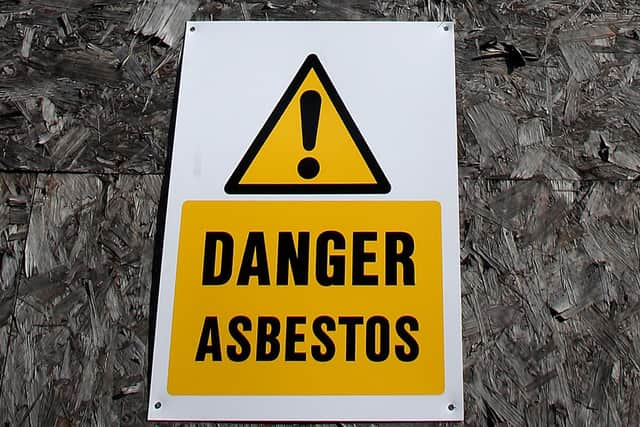Charity supports MPs’ call to act on asbestos dangers dubbed 'one of the great workplace tragedies of modern times'
The report from the Work and Pensions Committee highlights how despite being banned more than two decades ago, asbestos persists as the single greatest cause of work-related fatalities in the UK. There were more than 5,000 deaths in 2019, including from cancers such as mesothelioma.
Many of these deaths relate to exposures from 35 or more years ago and, while evidence indicates that cumulative exposures are much lower now for younger age groups, more data is needed to understand the current picture.
Advertisement
Hide AdAdvertisement
Hide AdAsbestos is still in around 300,000 non-domestic buildings and as there is likely to be a dramatic increase in disturbance from net zero retrofitting, the Committee says that reliance on the current asbestos regulations will not be good enough.


It concludes that a cross-government and ‘system-wide’ strategy for the long-term removal of asbestos is needed.
Rt Hon Stephen Timms MP, Chair of the Work and Pensions Committee, said: “Asbestos is one of the great workplace tragedies of modern times and while the extreme exposures of the late twentieth century are now behind us, the risk from asbestos remains real.
“The drive towards retrofitting of buildings to meet net zero aspirations means the risk of asbestos exposure will only escalate in the coming decades. Falling back on regulations which devolve responsibility to individual building owners and maintenance managers will not be sufficient to protect people’s health.”
Advertisement
Hide AdAdvertisement
Hide AdHe said the 40 year deadline would focus the project but there was no time for “laissez-faire” as the government needs to fund the HSE properly to allow it to reverse the decline in enforcement activity seen in the decade before the pandemic, with reports still of recent exposures, and to ensure that asbestos, and its removal, is managed safely and effectively.
Liz Darlison, Chief Executive of national asbestos-related cancer charity, Mesothelioma UK said: “We’re delighted with the Select Committee recommendation. They provided us with an opportunity to detail the reality of asbestos and listened.
“We now need the Government to respond with a commitment to resource the phased removal of asbestos from our buildings. We have the highest amounts in the developed world along with the death toll.”
Main findings and recommendations from the report revealed today are:
Advertisement
Hide AdAdvertisement
Hide AdWhile there is evidence extreme exposures of the 20th century are behind us, HSE is not doing enough to assess current levels of risk in non-domestic buildings. The Committee heard accounts of recent exposures in the workplace and beyond
HSE issued 60 per cent fewer asbestos enforcement notices annually between 2011-12 and 2018-19. The scale of decline is noted, compared with HSE’s enforcement activity overall, despite lack of evidence that compliance with the asbestos regulations has improved dramatically during this time.
